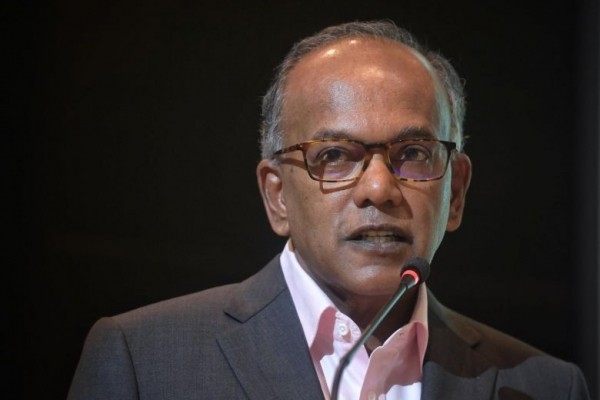Singapore needs laws to tackle foreign interference in domestic matters: Shanmugam

Home Affairs and Law Minister K. Shanmugam noted that while foreign interference is not new, the concept has been turbo-charged and revolutionised because of the Internet and the almost limitless possibilities it has opened up.
SINGAPORE – Foreign powers have sought to intervene in countries’ domestic affairs throughout history, and the Internet has revolutionised such interference.
It can be even more deadly than military force in undermining a country’s politics and stability, Home Affairs and Law Minister K. Shanmugam said on Wednesday (Sept 25).
Every country has the sovereign right to protect its national security, and Singapore sees it necessary to enact laws to counter attempts by foreign elements to influence domestic politics and opinion, he said.
He was speaking at the opening of a one-day conference on Foreign Interference Tactics and Countermeasures organised by the S. Rajaratnam School of International Studies, Nanyang Technological University, at the Parkroyal on Beach Road hotel.
The minister said that in addressing hostile information campaigns online, tech companies cannot be left alone to self-regulate.
These companies must operate within a regulatory framework that governments decide on, using approaches that are fair, reasonable and effective, he said.
States cannot take a hands-off approach, and in Singapore’s case, it is necessary to put in place its own legislative measures to counter attempts by foreign forces to influence domestic politics and opinion, he noted.
This will give the Government powers to tackle foreign interference attempts through targeted, surgical interventions, and to investigate and respond expeditiously to hostile information campaigns.
It must also have the power to get information in order to investigate the provenance of content, to see the extent to which it is foreign influenced and respond appropriately, he added.
Mr Shanmugam said that legislation to counter foreign interference needs to be able to deal with a diverse range of threats, such as the flow of funds, interference during and outside election periods, and foreign actors influencing domestic politics, such as in Germany, where evidence showed that a foreign power helped the rise of the far right.
“We may also need to consider how we restrict foreign participation in the leadership of specific organisations… that are closely involved in our political landscape,” he said.
“This is similar to our position on foreign participation in cause-based public assemblies and processions,” he added.
Online and offline influences
In his 45-minute speech which outlined multiple examples of how foreign interference has taken place in Singapore and around the world, including the 2016 United States election, Mr Shanmugam reiterated the need for Singapore to implement new laws to tackle the evolving threat, a point he made in Parliament earlier this year.
The minister also spelt out the various methods which foreign interference can take, such as the use of diplomatic channels to subvert and interfere with other states.
He cited several examples involving Singapore in the past; most recently, the case of academic Huang Jing who was expelled in 2017.
The then professor at the National University of Singapore’s Lee Kuan Yew School of Public Policy was identified as an agent of influence acting on behalf of a foreign country.
Other methods of foreign influence include the use of the media, such as via secret funding and control of the publications, and in other cases, having agents use the cover of journalists themselves.
States have also been known to target cause-based movements in other states, mobilising activists in order to advance foreign countries’ interests, said Mr Shanmugam.
While foreign interference is not new, the concept has been turbo-charged and revolutionised because of the Internet and the almost limitless possibilities it has opened up, he noted.
A military doctrine, dubbed the Gerasimov Doctrine after Russian military chief of staff Valery Gerasimov, has been developed in connection with this development.
The “Rules of War” have been redefined and non-kinetic military measures, such as hostile information campaigns, can identify the “protest potential” of any population of the target country, Mr Shanmugam said.
These campaigns can create protests which deepen the divisions and increase the hostility among different groups, and get people to distrust institutions or lower the trust in them, he added.
But the combination of online hostile information campaigns, and offline activities, such as foreign-controlled media and agents of influence, is extremely toxic and powerful, said Mr Shanmugam.
He cited the example of how this took place in Ukraine, where both online and offline methods were used by a foreign country to build a narrative against the country and its government which was labelled as fascist and corrupt.
Mr Shanmugam also related the example of Brexit, and how online campaigning and the use of falsehoods played upon people’s anti-Muslim and xenophobic sentiments.
He said: “All that hasn’t happened in its full glory in Singapore. But it can happen. Some of it has happened.”
There are attempts to combine some of the different approaches of foreign interference, and Mr Shanmugam outlined how a group of local activists, including historian Thum Ping Tjin and freelance journalist Kirsten Han, met Malaysian Prime Minister Mahathir Mohamad last year to urge him to bring democracy to Singapore.
The minister noted that Dr Thum and Ms Han also started New Naratif, which is funded by a foreign foundation and has received other foreign contributions as well.
He also cited how The Online Citizen, a news site targeting Singaporeans, also employs foreigners to write almost exclusively negative articles on Singapore politics – including inflammatory articles that seek to fracture social cohesion.
Said the minister: “Foreign interference is an age-old threat which has adapted to modern technology, and states must be able to deal with these threats.”
“This is an issue of sovereignty and national security. The governments have to lead from the front, and we need to ensure that we have the right tools to fight this threat,” he added.